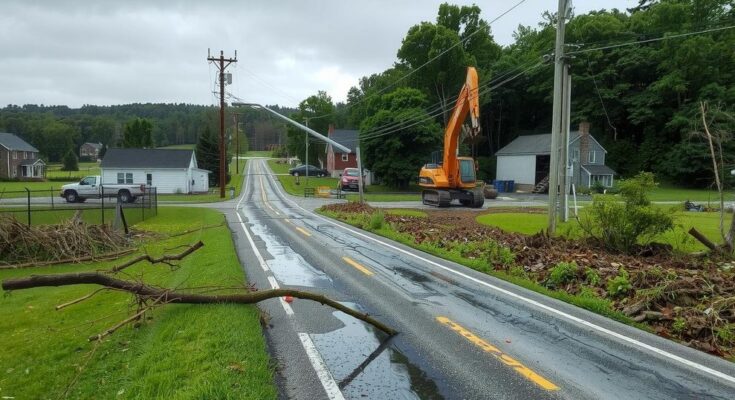Following Tropical Storm Debby in August, Tioga County saw a surge in emergency calls, resulting in significant flooding and property damage. The storm prompted a disaster declaration and over $12 million in federal relief funding, yet local officials emphasize the need for long-term solutions to mitigate future flooding risks. Many residents and local businesses continue to struggle with recovery, underscoring the urgency for infrastructure improvements.
Emergency services in Tioga County, Pennsylvania, experienced a significant surge in calls following Tropical Storm Debby, which struck in early August. Over a span of seven hours, dispatchers handled more than 500 emergency requests and dispatched aid 311 times, an unprecedented increase considering their typical volume of 75 to 100 calls daily. The sudden and severe flooding led to extensive property damage, leaving many residents trapped in their homes, with some unable to receive immediate assistance. The storm resulted in one reported fatality in Tioga County.
In response to the crisis, Pennsylvania Governor Josh Shapiro declared a disaster emergency affecting 28 counties. The Federal Emergency Management Agency (FEMA) promptly approved over $12 million in relief funding to support residents in the hard-hit areas, which include Lycoming, Potter, Tioga, and Union Counties. Those affected frequently reported damage to furnaces, with the average aid amounting to approximately $7,969. In Tioga County alone, there were 457 applications for financial assistance, helping some residents begin the recovery process.
Despite the short-term support provided by federal funds, Tioga County officials are focused on identifying long-term solutions to mitigate future flooding risks. Although flooding is a recurring issue, the rapid rise and concentration of water in areas like Westfield Borough were particularly alarming. Lisa Rice, the county’s 911 Director, emphasized the urgency of finding preventative measures, citing firsthand accounts from residents who faced sudden floods overwhelming their homes.
Individuals, such as Terry VanDusen, have experienced significant property losses during the storm, estimating his losses at around $75,000, despite receiving limited federal aid. The situation was similarly dire for local institutions, as demonstrated by the Westfield Child Development Center. Given the significant damages incurred by community members and local facilities alike, there are concerns about debris that may exacerbate future flooding if not properly addressed. The Tioga County Board of Commissioners is advocating for state and federal assistance to fund essential cleanup efforts in the local watershed.
As recovery initiatives unfold, it is crucial for Tioga County to prioritize preventive measures to avert the likelihood of such disasters reoccurring. Officials express that without proactive cleanup and infrastructure improvements, the region risks facing similar flooding situations that would effectively negate ongoing recovery efforts.
Tropical Storm Debby caused widespread flooding and damage in rural Pennsylvania, particularly in Tioga County. This disaster prompted a substantial response from emergency services and state authorities due to the extensive damage and disruption experienced by local residents. With the declaration of a disaster emergency and subsequent federal funding, the immediate focus was on recovery; however, officials are also pivoting towards implementing long-term solutions to prevent future flooding disasters in the region. The experience underscored the importance of community resilience and the need for better preparation against natural disasters.
In summary, Tropical Storm Debby inflicted severe damage on rural communities in Pennsylvania, specifically in Tioga County, leading to a state and federal emergency response. While immediate aid is being provided to residents, there is an urgent call for better infrastructure and cleanup efforts to prevent future flooding catastrophes. The experiences shared by affected individuals and officials highlight the community’s resilience and the critical need for sustainable solutions to mitigate the risks posed by severe weather events.
Original Source: www.wfmz.com




